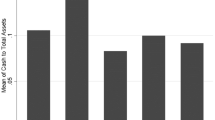Abstract
Starting from “incentive effects” and “encroachment effects” of the largest shareholders, this article analyzes how the largest shareholder’s changes of stake and nature affect cash value. Empirical studies show that, when financing constraints, caused by the largest shareholder’s moral hazard, do not exist, the relationship between stake and cash value is significant inverted U-shaped, and while the largest shareholder is government, it will weaken the positive effect of cash holdings on firm value; relative to non-government-controlled companies, the government-controlled company’s cash value is lower. When the above-mentioned financing constraints exist, the largest shareholder’s influences on cash value is not significant, but it can be seen the largest shareholder has negative effect on cash value in company with a high degree of financing constraints, which indicates that in the financing constrained company, largest shareholder’s “encroachment effects” is on the performance.
Access this chapter
Tax calculation will be finalised at checkout
Purchases are for personal use only
Similar content being viewed by others
References
Chong-en Bai, Xiao Liu, Zhou Lu, Min Song, Jun-xi Zhang (2005) An empirical study on Chinese listed firms’ corporate governance. Econ Res 51(2):81–91 (in Chinese)
Dittmar A, Mahrt-Smith J, Servaes H (2003) International corporate governance and corporate cash holdings. J Financ Quant Anal 38:111–133
Drobetz W, Grüningerb MC, Hirschvoglc S (2010) Information asymmetry and the value of cash. J Bank Financ 34:2168–2184
Fama EF, French KR (1998) Taxes, financing decisions, and firm value. J Financ 53:819–843
Fang Yi-qiang, Li-jun Xia (2005) Government control, environmental management and corporate value – empirical evidence from China’s securities market. Econ Res 51(5):40–51 (in Chinese)
Faulkender M (2002) Cash holdings among small businesses (unpublished)
Kalcheva I, Lins KV (2007) International evidence on cash holdings and expected managerial agency problems. Rev Financ Stud 20:1087–1112
La Porta R, Lopez-de Silanes F, Shleifer A, Vishny RW (2000) Agency problems and dividend policy around the world. J Financ 55:1–33
Li-hui Tian (2005) Two hands of the government shareholder and the U curve between government shareholdings and corporate value. Econ Res 10:48–58 (in Chinese)
Qi Luo, Guo-lou Qin (2009) Investor protection and corporate cash holdings. Financ Res 10:162–178 (in Chinese)
Qi Luo, Zhi-qiang Hu (2011) Controlling shareholder moral hazard and the strategy of the company’s cash. Econ Res 57(2):125–137 (in Chinese)
Shleife A, Vishny R (1997) A survey of corporate governance. J Financ 52:5–23
Xing-quan Yang, Zhao-nan Zhang (2010) Governance environment, the government controls and cash value. Econ Res 56(2):36–43 (in Chinese)
Yi-feng Shen, Xue-wen Kuang, Ya-juan Nie (2008) The impact of excess control of ultimate controlling shareholders on the value of cash holdings. Nan-kai Bus Rev 24(1):15–23 (in Chinese)
Zen-quan Li, Qian Yu, Xiao-kun Wang (2005) Tunneling, propping and M&A: evidence from Chinese listed companies. Econ Res 1:95–105 (in Chinese)
Author information
Authors and Affiliations
Corresponding author
Editor information
Editors and Affiliations
Rights and permissions
Copyright information
© 2013 Springer-Verlag Berlin Heidelberg
About this paper
Cite this paper
Ling, Zx., Li, Cl. (2013). How the Largest Shareholder Control Affects the Company’s Cash Value. In: Qi, E., Shen, J., Dou, R. (eds) The 19th International Conference on Industrial Engineering and Engineering Management. Springer, Berlin, Heidelberg. https://doi.org/10.1007/978-3-642-37270-4_66
Download citation
DOI: https://doi.org/10.1007/978-3-642-37270-4_66
Published:
Publisher Name: Springer, Berlin, Heidelberg
Print ISBN: 978-3-642-37269-8
Online ISBN: 978-3-642-37270-4
eBook Packages: Business and EconomicsBusiness and Management (R0)



